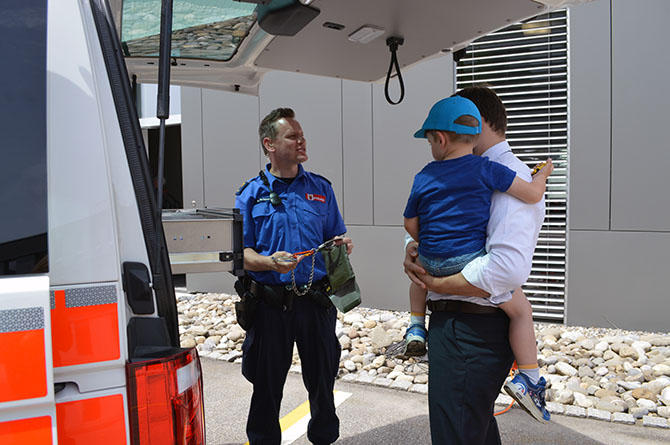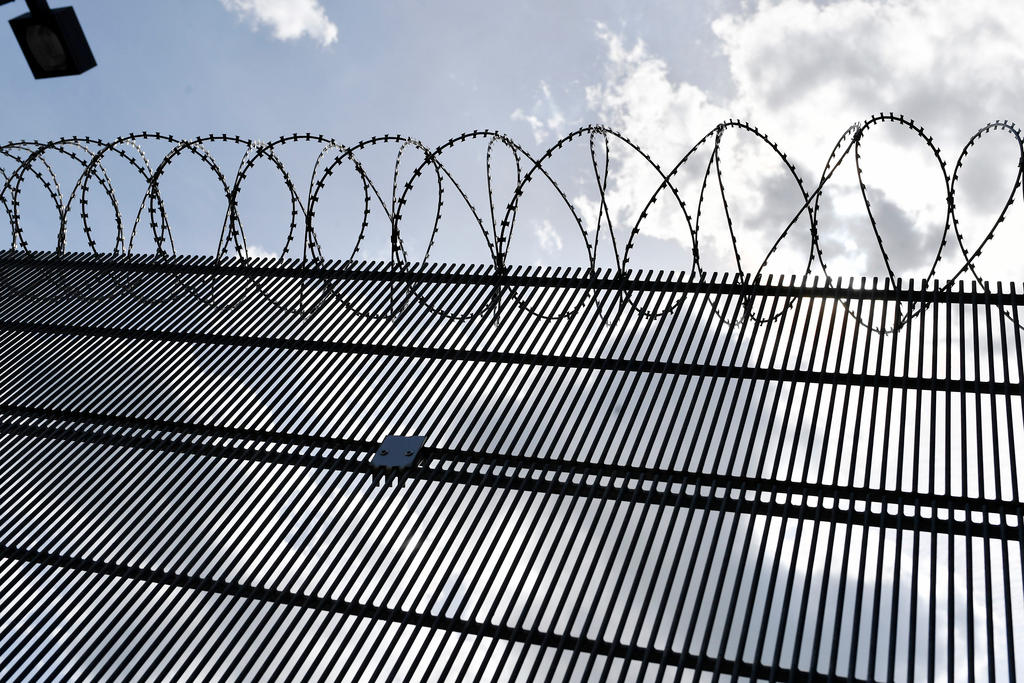A Swiss court throws opens its doors to visitors

The Swiss justice system is often criticised for its lack of transparency. The canton of Bern has an innovative approach to this problem: the activities of the courts are presented to the public as part of an open house.
Despite the nice weather at the start of the summer, many visitors flocked this past Saturday to a mock court hearing in the city of Burgdorf in canton Bern. The crowd was so large that some visitors had to be turned away.
But the open house of the regional courtExternal link of Emmental-Oberaargau (link in French and German) included several other attractions. In a small room, experts explained how children are questioned, for example, when their parents are engaged in a legal dispute. In another room, free legal advice was on offer. Prosecutors explained how often criminal acts are committed in Switzerland – far more often than numerous visitors would have thought.
Experiencing drunk driving
There were also attractions for the many children. Outside the courthouse, there were police vehicles and equipment to be discovered. What’s it like to wear handcuffs? Or to ride a bike or drive a car while intoxicated? A special vision device allowed participants to live the experience without consuming alcohol.

In another room, participants could view police training videos that allow people to determine whether they would make good witnesses. A fight – do you remember how many people were involved? A young man putting graffiti on the walls – what colour was his jacket? And what does the angry woman have in her hand? A knife! Oh no, it’s a pair of scissors. What seems simple is anything but; if we don’t know in advance what to look for, we forget the details or make mistakes.
The conclusion: some evidence heard in court must be considered with caution.
How to become a judge in Switzerland
As a federal state, Switzerland has several types of courts: regional (district), cantonal, and federal courtsExternal link (Federal Court, Federal Criminal Court, and Federal Administrative Court).
In most cantons, ordinary citizens can be elected by the people as justices of the peace or as lay judges in the courts of first instance. There is no need for special training. Most work part-time.
To become a professional judge, one must – in most cantons, but not all – have completed law studies. It is almost imperative to belong to a political party. Candidates are proposed by a party, then elected by the people, the parliament or the Federal Council. In higher jurisdictions, candidates usually have several years of professional experience in courts, law firms or notary studies, or as patent lawyers.
Against a secret justice system
In recent years, it has often been said that there is a secret justice system in Switzerland. The media accuse the courts of a lack of transparency in various domains: the courts’ agendas are sometimes communicated incompletely, journalists from some cantons must go through complex and costly accreditation procedures, protection of the character of accused persons is exaggerated, and access to rulings is made difficult or is totally impeded.
In the face of criticism, justice in canton Bern has been proactive. The Emmental-Oberaargau court is already the canton’s second to organise an open house. The event aims to help the public understand what exactly the regional courts do. And courts of first instance are precisely those that have the closest contact with the population.
Roland Richner, president of the Emmental-Oberaargau regional court, explains: “The idea behind the open house is to open up. We don’t want to be a cabinet court.” Moreover, legal procedures are becoming longer and more complicated. “Today, many things are regulated directly by criminal order,” he adds.
In effect, more than 90% of criminal rulings in Switzerland are made in the form of a criminal order. According to Swiss lawExternal link, prosecutors have the power to impose prison sentences of up to six months, pecuniary penalties or fines. These laws are communicated by mail and without justification. There is no trial.
What are the limits of publicity?
How does the population learn how judges interpret Swiss law? With their articles, the media take on, to some extent, the role of transmitter. But Switzerland is very restrictive: it is generally forbidden to film or take photos in a courtroom. “A trial cannot be the object of sensationalist articles. This is a serious thing,” declares Richner.
He notes that it is necessary to protect the private life of all parties concerned. “It would not be good to try and present oneself favourably as a judge,” he adds. In other words: judges must take the affair seriously instead of putting themselves in the limelight.
In the United States, on the other hand, it is common for every word spoken in a courtroom to be recorded on video and made public. In Switzerland people sometimes refer to “Anglo-Saxon conditions”, which must under no circumstances be imported into the alpine nation.
How to become a lawyer in Switzerland
To become a lawyer in Switzerland, it’s necessary first to study law and obtain a master’s degree. One must then complete an internship of at least one year under the study of a lawyer and pass a final exam. The duration and type of obligatory internship and the contents of the bar exam vary from canton to canton.
Thanks to an accord on the free movement of people with the European Union, lawyers from EU and EFTA countries can also practise in Switzerland. They just need to prove that they have the right to practise law in their country of origin. If they want to work permanently in Switzerland, they must register with a cantonal supervisory authority.
Richner confirms that there are certain cultural differences in this matter. “The United States has a different judicial system. In Switzerland, we are marked by continental Europe: here, the trial is not a spectacle.”
In the American system, the arguments of the prosecutor and of the defence are central, and the judge takes the position of arbiter. What is said before the court is all the more important.
This is not to say that a trial in Switzerland would be boring – which seems to be confirmed by the crowd that the Burgdorf open house has attracted. Richner himself is somewhat surprised by the great public interest in the event.
However, no other initiatives are anticipated to make the justice system more public. The judge is, for example, not too keen on the idea of publishing all judgments online. “That would require far too much effort to make things anonymous,” he explains. But the court does already publish the most interesting judgments.
On the right track
Is the open house is a good solution to bringing justice closer to the public?
On the one hand, the summer event was a success because it generated a lot of interest and the public was satisfied with the information provided. On the other hand, the basic problems between the court and the public, like the shift to judgments without trial via criminal orders, are not resolved during such an event.
In terms of opening up to the public, the regional court of Emmental-Oberaargau seems to be rather exemplary. For example, the session agenda is published online. Those seeking contact with the population seem to have less fear of the public in general.
Translated from French by Celia Luterbacher

In compliance with the JTI standards
More: SWI swissinfo.ch certified by the Journalism Trust Initiative












You can find an overview of ongoing debates with our journalists here . Please join us!
If you want to start a conversation about a topic raised in this article or want to report factual errors, email us at english@swissinfo.ch.